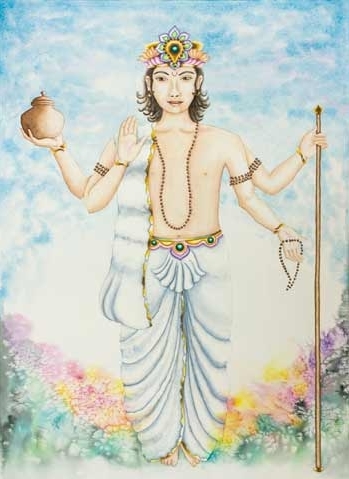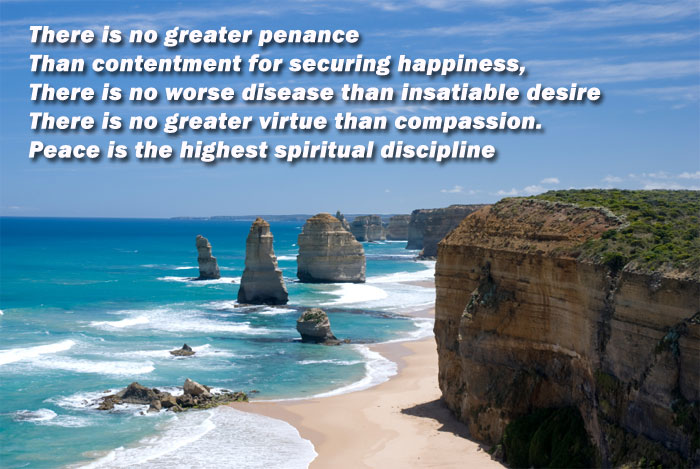Human Values and Astrology
Value:Peace; Sub-value: Contentment
Planet (graha) Venus (Sukra)

Om Aswadhwajaaya Vidmahe
Dhanur hastaaya dheemahi
Tanno shukra prachodayaat
The Planet Venus is known in Vedic Astrology as Shukra, the celestial poet, son of Lord Bhrigu (var, Bhrugu), and is dispositor or karaka of artistic grace and beauty, refinement and contentment.
Venus shows our affection and sense of harmony in life. Among the planets, Venus is our appreciation of the beautiful and as such represents our aesthetic sense. Venus is significator of art, poetry, painting, music and dance. Venus is the muse in life, our sense of the beloved that draws out our creative expression. Venus indicates sensitivity, refinement and gentleness.
Human Values
Our values are our principles, our guides to action. Values are our codes of internal conduct, the principles upon which we run our lives and make our decisions. Our values are first given to us by our parents, and these are developed, expanded, tested in experience. Other people impress values upon us, such as those values given to us by our peers, our teachers, the wider community. Our moral values are often sourced from our faith systems. It is from these that we select the principles which guide our lives and our behaviours. The strongest impression of values upon us is the example set by another person.
Our values often include universal principles such as truthfulness, peace, love, right conduct and non-violence. These principles are often essential for our personal and social survival. Putting things back to front, we can often work out what values are present in a situation or an event or a reaction (our own)(someone else's) when we analyse either ourselves or others, for behaviour reveals choices, and choices are based on our values.
In Vedic Astrology, Venus is the giver of truth, goodness and beauty, in Sanskrit, Sathyam, Sivam, Sundaram. Truth, goodness and beauty are expressions of what is within the human being, the aesthetic sense, the creation and appreciation of objects of beauty, inspiration and that which makes the human spirit soar. It could easily be said that Venus takes humanity to the beautiful things of heaven, on Earth. This occurs when we follow and practice the five human values, Truth (sathya), Right Conduct (dharma), Love (prema), Peace (shanti) and Non-violence (ahimsa) in our lives.
So here we may explore the role the of the Planet Venus in our lives, and how Venus disposes is to live our life with Truth (sathya), Right Conduct (dharma), Love (prema), Peace (shanti) and Non-violence (ahimsa) in our lives.
Venus and Contentment
Contentment, happiness and satisfaction are the fruits of truth, forbearance, limiting desires, control of the senses, utilising our inherent skills and abilities to the fullness of our capacity. We use our tools to refine that which is within and without us; to transform our environment with refinement and grace. The main Vedic name for the Venus is Shukra, which means luminous, shining, bright. It is Venus, Shukra, which transforms our surroundings, our environment, our homes into objects of beauty and purity, with refinement of elegance, beauty and style.
Actions which give expression to contentment are those which take up our skills and abilities and create objects, experiences, environments which enhance the human state and raise experience to aesthetic appreciation of grace, effort, beauty. We may may do this with food, we may do this in sporting performances (think of synchronised swimming, gymnastics, team sports diving) and in the crafts, with pottery, crochet, sewing, knitting, and craft work. We may do this in creating a garden, in communing with nature, in poetry, painting, film-making, in music, theatre and dance.
What is Contentment?
Contentment is the fruit of forbearance, the company of the good, limiting desires, control of the senses and transformation of our environment into beauty and purity and the echelons of human achievement.
What does Contentment look like?
Contentment is patience, self-satisfaction, harmony in the home and surroundings, satisfaction with personal needs, belongings and possessions. Contentment is not a needy state of being, it is an abiding peace, a satisfaction with self, others and the world around us, our environment. It is an awareness of creation as Sathyam, Sivam, Sundaram, truth, goodness and beauty.
What are the Fruits of Contentment:
Contentment creates a harmonious environment, it builds community, it grants peace, it gives enhancement to the human state. Contentment expands and shares of itself; it gives joy, happiness and peace, along with harmony and inspiration to others. It builds stronger family, stronger devotion, stronger company and strong relations with extended family and our community. Contentment of its nature is not a lone bull in a paddock, but rather, a community of abiding peace and refinement which is inclusive of all that come into its ambit, its path.
What is "doing" Contentment?:
When desires are controlled, the senses are under the control of the intellect and conscience, this is contentment. When you are happy with yourself and happy with others, this is contentment. When you choose good company, the company of the good and godly, who share and practice the same values, this is an important foundation of contentment. Contentment to a large degree depends on your company. When you use your skills to perform in sport, to create a garden, to create a work of art, to enjoy theatre, music, film and dance, this is contentment. Contentment creates objects of elegance, beauty and purity. Contentment frees you up to be unselfish, you are not greedy, you are free to share, free to serve others in a selfless manner.
Venus as karaka (disposer, energiser, motivator) of Contentment and the aesthetic beauty creates new vistas of human experience. It gives a profound appreciation of the creativity of others, gracefulness, and pleasure and satisfaction at the beautiful things in life. Venus gives balance in beauty, as we sail in the boat down the river of our lives, we should not veer to the bank of the river which has extremes of asceticism and self-abasement, abnegation; no, no, contentment is not this. Nor should we veer to the other bank into over-indulgence and satiation of personal desires beyond limits. This is not contentment, it is the lower, base, selfish effect of an afflicted Venus. The grace and elegance, the shakti of contentment which Venus is karaka - dispositor of, has us sailing down the middle of that river of life, appreciating the good things of life and their aesthetic beauty.
Obstacles to Contentment:
Anxiety, acquisitiveness, hoarding and greed are not contentment. Contentment is not crude accumulation of objects of beauty and holding them for our own exclusive satisfaction. Contentment does not "keep up with the Jones's" out of anxiety and comparing ourselves to others, for, when we compare ourselves to others, all we do is denigrate our own true Self, our worth and our capacity. Contentment is never restlessness, it is "making do" with that which is ours, our inherent skills and abilities and creating an environment worth living in and having satisfaction with the fruits of our labours, our giftedness. Contentment is not shallow glamour and showmanship.
Contentment gives appreciation of others, their creativity (along with our own creativity), it gives peace, stability and patience. It frees us up, allowing energy to flow towards thoughts that elevate. In appreciation of grace and beauty, contentment allows new perceptions, new experiences of human artistry and achievement. Contentment - a basic satisfaction with myself, the world, and others - allows me to be free to share with others, to serve, to give to others where they do not have. Contentment leads to truth.
Contentment and Peace
There is no penance equal to a peaceful mind;
There is no greater happiness than contentment;
There is no worse disease than desire;
No righteousness can equal kindness.
Women and Contentment
Men should not discourage women from performing sacred rituals like Varalakshmi Vrata. They should provide all the necessary support. This ritual is beneficial not only to women, but also to men. Men should not behave in an arrogant way towards women thinking that they are more powerful. Truly speaking, women are more powerful than men. The Bhagavad Gita says that men have only three powers, whereas women have five. Women are ready to sacrifice even their life for the sake of their husbands. Savitri was ready to give up her life for the sake of her husband. But we do not find such spirit of sacrifice in men. Respect, dignity, sacrifice, contentment and prosperity, all these five virtues are present in women. On the other hand, men stand for anger, stubbornness and foolishness. Names of the Divine couples like Lakshmi Narayana, Radha Krishna and Parvati Parameswara indicate that women are given place of priority over men. That is why even in invitation cards, people write Srimati and Sri (Mrs. and Mr.) and not the other way. Prakriti symbolizes feminine aspect. Therefore, men must treat women with respect, so that they will be respected in turn. As the women are the embodiments of Lakshmi (goddess of wealth), the world will attain prosperity only when they are respected. You can see it yourself, where there are women of character, there you find all prosperity. You all know that many countries suffered destruction during the World Wars. If Bharat could remain intact, it is entirely due to the presence of virtuous women. Bharat owes its greatness and grandeur entirely to its women. So, respect women and make them happy. Sathya Sai Baba, 11 August 2000
The Contentment Principle Within signified by the Venus
The planet Venus is the principle of harmony, beauty and relationship. The human value of peace scopes to include patience, concentration, positiveness, self-acceptance, self discipline, gratitude and appreciation for the good things of life; all these elements comprise our peace and contentment. Venus energises appreciation of fine clothes, music and dance, musical instruments, sport and recreation, poetry and prose. Venus is found in theatres, cinemas, dance halls and the season of Vasantha, or Spring.
Without excessive glamour, showmanship, hoarding nor showing off, the contentment aspect energised by the planet Venus shares those human qualities of goodness, beauty and truth with all others. Sathyam, Sivam, Sundaram are attributes of the Kalapurusha, the body of Cosmic Universe, the energy of the Cosmos made manifest. All planets channel this energy, but Venus adds gracefulness, charm and the capacity of the human spirit to soar. It is our bounden duty to harness the energies of the planets, to utilise them to create a world worth living in, and to live in it to the fullness of our capacity, within the constraints of discrimination, conscience, control of the senses and control of desires. Such disciplined living has the ability, through the energies of Venus, to make beauty and harmony -- in addition to fruitful harmonious relationships -- in human living and endeavour.
Earlier we examined the composition of contentment. It was found that forbearance, company of the good, limiting desires and control of the senses are principal components of contentment. Consider the image below:

Limiting desires and the senses is a spiritual activity, a penance, tapas in Sanskrit. Without self-control, self discipline, there can be no human progress, no aesthetic beauty to appreciate nor live with. Insatiable desire is destructive to contentment, for ego itself generates the need for satisfaction of desire so that it may rule the mind, the intellect, the senses. An uncontrolled ego cannot appreciate the good things in life and only seeks to expand its territory within and without with possessions, acquisition, jealousy, lust and greed. These are not components of contentment. Contentment of its nature shares itself, and sharing is a form of compassion, for sharing is always done to the heart of the other, where the divine itself resides as hrudaya vasi, the compassionate indweller of the heart. Contentment, as a value which makes up the human value of Peace, is founded on spiritual discipline in all its compartments.
![]()
